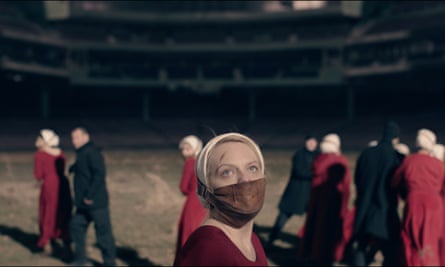Margaret Atwood has admitted having no control over the TV version of her harrowing novel The Handmaid’s Tale but, she says, she has no problem with that.
“I think I would have to be awfully stupid to resent it because things could have been so much worse,” she told an audience at the Hay literary festival in Wales. “They have done a tippety-top job ... the acting is great, they’ve stuck to the central set of premises.”
The latest second series diverges sharply from her novel but people should not concern themselves, she said.
“It’s a television series. If you’re going to have a series you can’t kill off the central character and you also can’t have the central character escape to safety in episode one of season two. It’s not going to happen.”
Atwood’s horrifying novel, in which women are enslaved, raped and mutilated in the service of a patriarchal theocracy, was written by Atwood in 1984 and has left its mark on generations of readers. To many it has taken on a new prescience in the era of Donald Trump.
A new generation will know it better from the TV series, broadcast in the UK on Channel 4 and in the US on Hulu.
Atwood said there was no way she could have any control over the series because of the history of the rights that were acquired by the distributors of the 1989 film.

Only Dallas-type soap operas were being made at the time. For 20 years no-one wanted to make the TV series and people forgot who owned the rights, she said. “I think somewhat to their surprise, it turned out to be MGM who sold them to Hulu.
“None of this was in any way under my control. Even if I had thrown a tantrum and said you can’t do this, that would have had no legal standing.”
Atwood said seven of the 10-strong writing team were women and, to audience laughter, she recalled meeting the show’s creator, who said: “Hi I’m Bruce Miller and I’m the show-runner and I have got one penis too many. But I’ve hired a lot of women.
“And then he said ‘I thought they would all agree on everything!’”
The 1,700 tickets for Atwood’s appearance sold out faster than any other event in Hay’s 31-year history. In the front row, to the surprise of some, was the Conservative Brexit negotiator, David Davis.
Atwood writes novels that can be breathtakingly shocking and pessimistic – the New Yorker called her the “prophet of dystopia” – and she speaks eloquently about issues from Trump to climate change.
Asked if she felt optimistic about anything, Atwood said there were glimmers, including the abortion vote in Ireland and the anti-Trump pushback in the US.
“It has galvanised a lot of young people. Had those people voted in the last election the current incumbent would not have won.”
She also made plenty of jokes including one involving a scene for the new TV series shot with bodies hanging from a wall, filmed at a chapel at Duke University in North Carolina, “when the door opened and out came a wedding rehearsal.”
And she revealed how she came up with the name of the main character, Offred. The writer said she wrote a page of men’s names and put the letters O and F in front of each. “Ofkeith” just didn’t work, she said.
